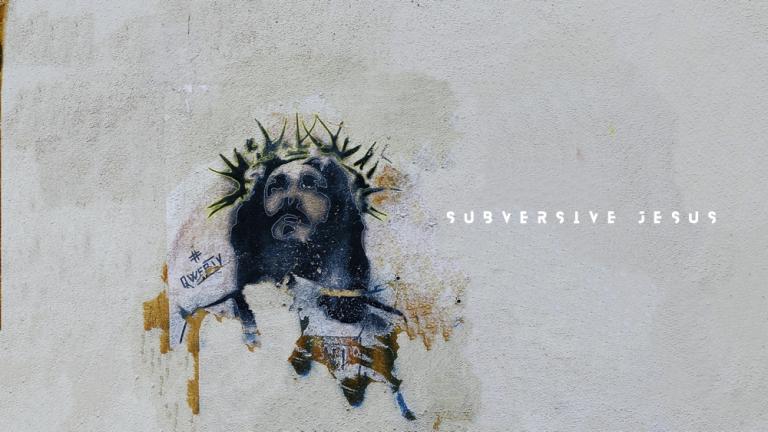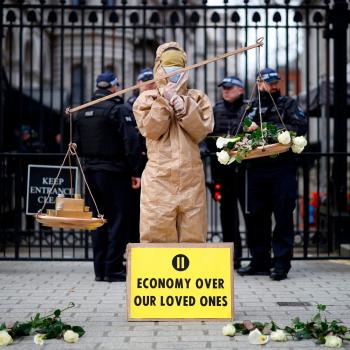 The Subversive Part of Jesus All of us Have Seemed to Miss
The Subversive Part of Jesus All of us Have Seemed to Miss
You have heard that it was said, An eye for an eye and a tooth for a tooth. But I say to you, Do not resist the one who is evil. But if anyone slaps you on the right cheek, turn to him the other also. And if anyone would sue you and take your tunic, let him have your cloak as well. And if anyone forces you to go one mile, go with him two miles.
– Jesus (Matthew 5:38-41)
Most pastors when preaching about this particular pericope aren’t wrong in their interpretations. Many of us, including myself, have completely missed the genius behind the words of Jesus [here, in Matthew 5:38-41].
As most of us have, at one point or another heard this used to promote the message of nonviolence. I love this. And, I agree in that, there’s a definitive message here from Jesus preaching a form of “non-resistance” – what we many times miss in this is the culture nuance from all of this. When we hear “do not resist” we interpret this to me one should be passively inactive. I wrote more on this here, in my post on “Pseudo-Pacificism“.
In my own opinion, the words “passive” or “inactive” were anything but what I’d describe being within the nature and character of Jesus. The word I’m using here today is “subversive.”
It was Jesus’ subversive genius that allowed Him to change and take hold of His narrative.
Within our modern day American world, we are taught to interpret much of it through a lens of power. Historically, we’re lead to believe their paradigms were also fueled, focussed, and centered on power. But, for Jesus, you see, it wasn’t about power so much as it was about humanity.
Here’s the thing: Jesus was never about power; He was about liberation. But, in order to liberate people [rich or poor] he had to, many times, subvert their structures.
In order for constructs to work, one must buy into them. To put it another way: in order for the rules of a game to matter, one must, typically, participate in whatever game those rules are attributed to.
There’s a lot to learn from this considering not so much has changed over the years [err, millenia] – which is why I wanted to hone in on and highlight three ways Jesus was unknowingly subversive in this particular pericope:
One.
“But if anyone slaps you on the right cheek, turn to him the other also.”
Considering that first century culture was just as hierarchal as our 21st-century culture, it begs us to question human nature and, seemingly, our insatiable thirst for power. But, although expressions of power shift a couple thousand years later a slap to the face is still more insulting than a punch. During the first century, it’s said that there were two primary ways to hit a person: (1) a punch with a closed right fist, and (2) a slap with the back of the right hand. During that time, again, similar to today, punches were reserved for equals while slaps were reserved for those who one deemed as “lower” or “less than”.
All of this begs the question: Why was Jesus so specific about which cheek someone struck you on. Because, if someone hit you on the right cheek then they were backhandedly slapping you with their right hand – i.e. they were deeming you a lesser being. So, was Jesus knowingly saying this so that by turning the other cheek we are forcing our oppressors to treat us as equal?
“Matthew Luz et. al have highlighted that “the slap on the right cheek is not what would ordinarily happen; since one either must be left-handed or hit with the back of the hand…”
Two.
“And if anyone would sue you and take your tunic, let him have your cloak as well.”
As many of us have seen in paintings of Jesus, you generally wore two garments: a tunic and a cloak. So when Jesus says “if anyone would sue you and take your tunic, let him have your cloak as well…” He’s oddly telling one to get naked. He’s saying this because during this time being naked wasn’t as shameful as the one viewing your nakedness. Shame, Jesus knew, similar to today, is a very powerful tool. It’s an emotion that people will avoid at all costs. Forcing someone to be naked and then seeing them nude would allow room for thought; it would subversively force their hand to then hopefully reconsider whether or not the cost of shame is worth this minute temporal feeling of “empowerment”.
Three.
“And if anyone forces you to go one mile, go with him two miles.”
This is a subtle nod to first-century Roman law. At that time, remembering this is well before cars or trains, a soldier could order any given civilian to carry his pack, but there was a limit, one mile. Although, there were donkeys and mules used to carry their equipment – possible conjecture here, but, it’s possible that being ordered to [by law] to carry a soldiers pack was a form of degradation – so when Jesus says, “And if anyone forces you to go one mile, go with him two miles.” You’d then have the playing fields evening out when the soldier is then begging you to give his belongings back in order that he does not break the law of “one mile”… it’s a paradigm shift.
You notice here that Jesus was never encouraging violence. In fact, he exhorts his followers to “not resist.”
He knew people spend their lives chasing after wind instead of just sitting back and enjoying the breeze.
He knew that there are people who didn’t feel joy from winning or, from seeing other people win; they found joy from seeing other people lose.
We fast forward through the red letters, zooming in while not losing sight of the bigger picture, and we see Jesus saying a few chapters later: 18 For John came neither eating nor drinking, and they say, ‘He has a demon.’19 The Son of Man came eating and drinking, and they say, ‘Here is a glutton and a drunkard, a friend of tax collectors and sinners.’ But wisdom is proved right by her deeds.” (Matthew 11:18-19)
Be wise and understand that there is no joy found in vengeance.
There is no life found in violence. Maybe this is why He also said: “that the thief comes to kill, steal, and destroy but, I have come to give you life…”
Maybe He wasn’t being so literal when saying to the zealots that if you “live by the sword then, you’ll die by the sword.”
What we all love so much about Jesus is that he wasn’t trying to “Lord” himself over anyone – He had the power to but, yet, He chose not to. These men may have felt like He was but, Christ was simply not participating in their games.
Do you want power or, do you want to experience the Kingdom?
Is it not wise to simply pay no attention while the men in power eat their cake while chasing after the wind? Or, should we allow ourselves to be consumed with anger because we’ve given them the permission to determine our worth?
[If you enjoyed this read head over and like my Facebook page ]












